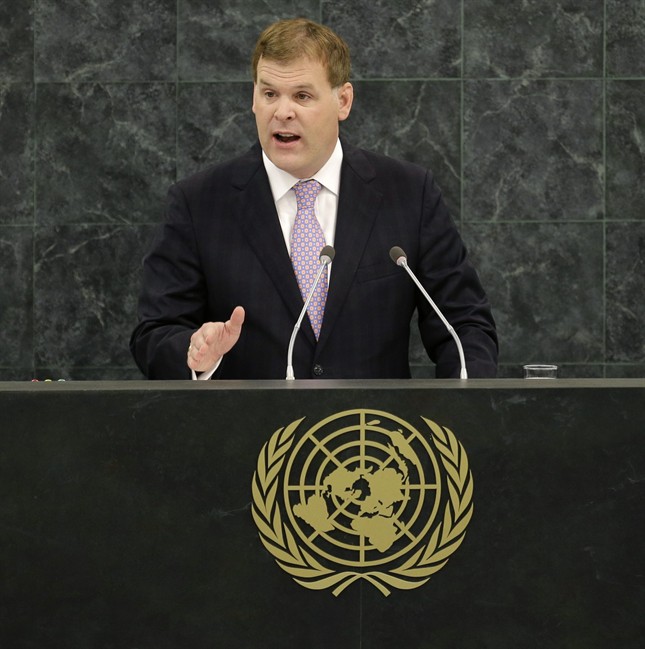OTTAWA – Foreign Affairs Minister John Baird says he’s open to hearing from critics of the government’s much-maligned bill that would ratify Canada’s participation in the international treaty to ban deadly cluster bombs.

But Baird made no promises he would back down from a contentious clause that would allow the Canadian Forces to be involved in the use of cluster bombs in joint operations with the United States, which has opted out of the convention.
That so-called interoperability clause has opened Canada to a wide range of criticism from across Canada and the world, including the normally neutral International Committee of the Red Cross.
Last month, at a major international meeting of states who are parties to the cluster bomb convention, Canada faced a renewed round of calls to amend what was called a flawed bill, to close the loophole.
“I’m certainly keen to go to committee to hear the concerns members may have with it,” Baird said Friday after the bill was formally tabled in the House of Commons for further committee study.
The same version of the bill had been introduced in the Senate, where it also went through vigorous committee hearings, but was not changed.
Baird said he also wants his critics to listen to him at the committee.
“There’s one very narrow part of the (bill) that’s contentious and I’m keen to provide a better briefing and explanation to it before the committee,” the minister said.
“We’re prepared to listen. I hope the opposition will be prepared to listen in that same spirit.”
In previous Senate committee testimony, Baird defended the need for Canada to preserve its ability to conduct joint military operations with the U.S.
Paul Dewar, the NDP’s foreign affairs critic, said the bill will be subject to a thorough examination by the Commons foreign affairs committee.
“It has become clear that the government has failed to engage in appropriate consultation on this important legislation,” Dewar said.
“We look forward to hearing from a wide range of witnesses at foreign affairs committee, and to giving cluster munitions the attention and response they deserve.”
Baird faced renewed calls Friday to amend the bill and close the loophole. Critics say Canada’s bill, as is, would essentially water down the Convention on Cluster Munitions.
“We hope that the time off for the summer recess has given the government time to reflect on the need to revise the draft implementation legislation,” said Paul Hannon, Executive Director of Mines Action Canada.
Walter Dorn, a professor at the Royal Military College of Canada, blasted the government and urged it to amend the “obnoxious portions” of the bill.
Dorn said the bill “opens a gaping loophole, one big enough to fit planeloads of cluster bombs.”
“Those portions go against the purpose of the treaty and serve as a bad example,” he added.
“Canada should, instead, set a good example for the ratification of this important global arms control measure by closing the legislation’s loophole and making sure no Canadians are authorized or forced to assist, direct, aid and abet or conspire with others to use cluster munitions.”
Canada signed the convention in 2008 but has yet to ratify the treaty, a delay that has also sparked criticism. It introduced legislation in the Senate only a year ago.
Canada’s chief negotiator of the convention, Earl Turcotte, resigned in protest from the federal public service because of the loophole clause. He too has testified before the Senate, urging the government to amend the bill.
Turcotte along with various critics say that the current Canadian bill undermines the spirit and intent of the treaty, which is to ban a dangerous military weapon that has proven particularly harmful to civilians.
A single cluster contains hundreds of smaller, baseball-sized explosives that can lay unexploded for decades, bringing pain and suffering to innocent civilians, especially young children, who are drawn to the brightly coloured bomblets.
Earlier this month, Baird travelled to Laos, which is the most cluster bomb-contaminated country in the world on a per capita basis. The tiny south Asian country is suffering the modern day legacy of the nine years of clandestine bombing it endured from the United States during the Vietnam War.
Baird announced a $1-million contribution to help clear the unexploded ordnance.
The new funds were announced after Canada cut its funding to Laos, after contributing more than $2 million between 1996 and 2011, which was first reported by The Canadian Press after visiting the country.
“The minister’s recent visit to Laos will have given him a first-hand view of the devastation caused by these indiscriminate and dangerous weapons. They should never again be used by anyone and Canada’s legislation should reinforce that,” said Hannon.
Baird acknowledged his recent trip to Laos on Friday saying the continued use of cluster munitions is “horrific.”
“They still kill people every week.”


Comments